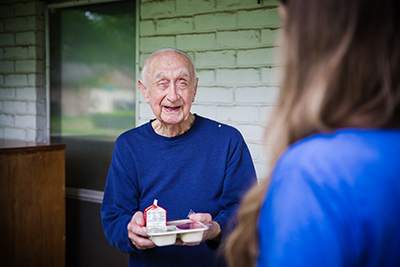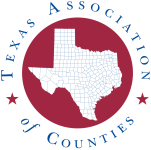County Magazine | October 25, 2023
County-funded senior programs make a difference, one meal at a time
A hot meal can make all the difference, no matter your age.
But this is especially true for older adults and people with health issues that make leaving their homes difficult.
For more than 50 years, Meals on Wheels and other similar organizations have taken on the task of preparing and delivering meals to people at home, and in some places, county governments help fund these programs.
For 45 years, El Paso County has teamed up with the city of El Paso to run the El Paso County Senior Nutrition Program, which feeds more than 1,000 residents throughout the ninth-most populous county in the state, according to program manager Rosalva Hernandez.
"A warm, nutritious meal delivered to a homebound program participant is not only about food security, but the driver who delivers their meals every week and cares to ask how they are doing and feeling means the world to the recipient of the meal."
— Rosalva Hernandez, El Paso County Senior Nutrition Program manager
Each weekday, a staff of 20 prepares and packages hot meals in a central kitchen in El Paso's Segundo Barrio downtown that are then delivered by another 22 volunteers and paid staff members to residents throughout the county. Several hundred of those meals are also delivered to 16 senior centers in the area, six of which are owned by the county.
Hernandez said pooling city and county resources ensures these community members can have free, nutritious meals most days of the week.
"A warm, nutritious meal delivered to a homebound program participant is not only about food security, but the driver who delivers their meals every week and cares to ask how they are doing and feeling means the world to the recipient of the meal," Hernandez said. "Some participants have no one, and their delivery driver may be the only person they consider a family member."
For older people who are physically active, the congregate centers become a place where they can participate in a well-being activity and see people who know their names.
During the COVID-19 pandemic, all congregate centers closed and did not reopen until November 2021, so they started preparing food in advance that could be frozen. Regular home delivery clients and the congregate clients received five meals at a time.
In Wharton and Colorado counties, the Wharton County Junior College Senior Citizen Program has been helping older adults and homebound people for more than three decades.

Director Traci Myers and her team of two employees – plus a part-time driver – deliver several hundred meals a week to folks in the towns of Wharton, El Campo, Columbus, Eagle Lake and Weimar.
They also serve a congregate meal every weekday in a building at Wharton County Junior College not far from the cosmetology and automotive classrooms, Myers said. After lunch, the guests can hang around for afternoon activities, including arts and crafts, bingo and dominos. "They love 42," she said. "That's a big draw."
"There are a lot of seniors whose families are gone or all their families are far away," she said. "They just like to get out of the house and visit with people. [The congregate meal] really enriches their lives so they don't sit at home all day."
The junior college provides the space and janitorial services for free, and the meals are paid for through state and federal grants, as well as money from the Colorado and Wharton commissioners courts.
Myers, who has been in the position for about a year, said she has seen older people struggling with both the cost of food and the isolation that lingers from the pandemic.
"The longer I'm in this position, it seems to me that there's a bigger need in the smaller, rural areas," she said.
The program also provides transportation for older adults to get to the grocery store, pharmacy or even medical appointments. "The goal is to keep them as independent as possible for as long as possible," said Myers, who is in need of two additional vans to meet needs. "They never want to ask for help, though, because they don't want to feel like a burden."
Montgomery County is another place where a lack of public transportation can make it difficult for seniors to get around. The local Meals on Wheels chapter provides free rides for older people and homebound residents in addition to hot meal delivery, said development director Carrie Watkins.

"Our rides are used for things like dialysis three times a week that they wouldn't be able to make otherwise," Watkins said. "Transportation is a critical piece of the puzzle."
Meals on Wheels Montgomery County, which receives about $270,000 a year from the county, is celebrating its 50th year in 2023 with the shortest waiting list it has had in decades. "When COVID started, we had 600 clients and something like 450 people on the waiting list," Watkins said.
But now that they've moved into a new commercial kitchen and increased their community fundraising efforts, those numbers have changed dramatically.
They've doubled the number of meals going out from the kitchen and now serve more than 950 clients every week and 65 people on the waitlist.
"It costs $1,800 a year to feed each one of them, and we feed them for the rest of their lives," Watkins said.

